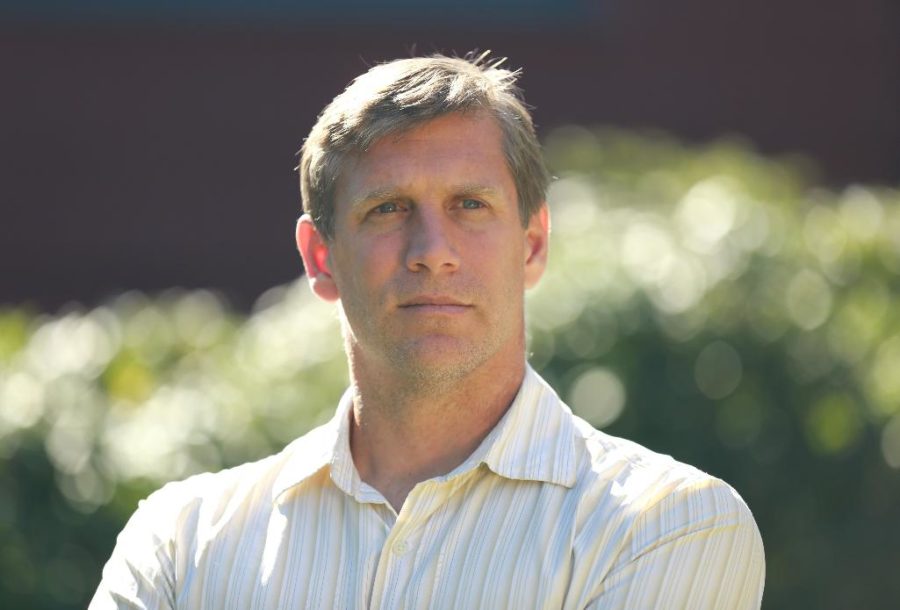Transhumanist party head makes run for presidency
June 22, 2016
There are many men grasping for power today, whether it be for the want of a better border, a better healthcare system, a better economy, or a better democracy.
Zoltan Istvan, head of the Transhumanist Party and 2016 Presidential candidate, is not different-he wants a better human.
Istvan is a philosopher, author, journalist, and now, politician living in Los Angeles, California.
After publishing his book, The Transhumanist Wager, a philosophical science fiction novel, in 2013 Istvan began actively promoting transhumanism and other futurist issues via speeches, interviews, activism, and writing.
Transhumanism is the philosophy that humanity can evolve beyond its current physical and mental limitations through the use of science and technology. Istvan believes that this process will unfold fairly quickly in the next few years.
“I expect not to die. Transhumanism will grow and grow, until we are way beyond even machines. I suspect in 100 years we will be pure organized energy–that’s how fast evolution will grow once we tap into machine intelligence, which will be in about 25 years,” said Istvan in an email-based interview this March.
Istvan’s writings and ideas on transhumanism, philosophy, atheism, and futurist issues have been featured in Yahoo News, The Daily Telegraph, Business Insider, Fox News Channel’s Stossel show, CNN’s Inside Man, Gizmodo, and the Joe Rogan Experience among many others.
Having received his Bachelor’s degree from Columbia University in Religion and Philosophy, Istvan began his career as a journalist working for the National Geographic Channel. Istvan’s coverage of the war in Kashmir was made into a documentary, Pawns of Paradise, which is regarded highly as one of the most in depth coverages of the war and its effects on the people of Kashmir.
Istvan is a member of the World Future Society, a volunteer Ambassador for The Seasteading Institute, an advisory board member of the India Future Society, a member of the Young Professionals, an advisory board member of A-Team for Wildlife, and is on the Futurist and Space Settlement boards of the Lifeboat Foundation. These organizations may sound unfamiliar, but most of them deal with finding new places for humans to dwell, finding better ways for humans to live, and protecting endangered species.
“ I believe 100% in climate change. I would like to stop it, but I doubt that’s possible at this point. Humans have messed with the planet too much. Our best way to deal with it is to make ourselves transhuman so we aren’t susceptible to environmental hazards, like dirty air, or lack of food. Transhuman won’t need to eat in the future if they’re mostly machines. And breathing air is not a very smart system. Transhumans need to evolve out of it. All this said, I do think, in the meantime, that lessening the carbon footprint of the human race on planet earth is practical to try to slow global warming,” said Istvan regarding climate change.
His presidential platform has a series of points ranging from tracking criminals to decrease incarceration rates, to providing free education to our citizens. One of these points includes the microchipping of citizens in order to prevent bodily injury, which brings into question the use of these chips for the monitoring of private lives by the government.
“The people can always ensure anything, so they must stand up to the government and companies and say their want to have their privacy ensured. However, we also need to understand that our privacy is being chipped away at with this technology. That’s life. But the technology is making the world much safer and more efficient. There have always been trade-offs, and this will be one of them. However, individuals can control how much they are monitored, and that is important that always remains the case,” said Istvan.
Must of Istvan’s campaign focuses around science and atheism. As much of the citizens of the United States are explicitly involved in religious activity and belief, this may pose a conflict with his campaign, but Istvan believes otherwise.
“ I think many Americans are losing their religion, and I suspect in 15 years half the country will identify as nonreligious (or barely religious–which is almost the same thing). As the country becomes less fundamentally religious, science and logic will prevail in culture. That will be great progress,” he said.
Q:The Transhumanist platform includes using innovative technology to monitor criminals outside of prison in order to reduce the incarceration rate. Do you see this as invading the privacy of said criminals?
Criminals don’t have many rights to or against privacy, as they committed crimes and their rights were stripped from them. So I’m not too worried about technology invading their lives.
Q:How would you limit the use of such monitoring systems?
I would try to be fair and balanced, and I assume there would be trial runs too, to make sure the system works well and is fair.
Q:How far do you expect Transhumanism to advance in your lifetime?
I expect not to die, so transhumanism will grow and grow, until we are way beyond even machines. I suspect in 100 years we will be pure organized energy–that’s how fast evolution will grow once we tap into machine intelligence, which will be in about 25 years.
Q:You’ve studied philosophy and religion at high levels. How has this affected your political stances?
Studying religion made me dislike it, since I realized how bent on controlling people it is. Studying philosophy was wonderful. Learning how to reason and use logic is imperative for leadership and governing.
Q:About 87% of Americans identify as religious. How do you think your stances on science and logic will sit with their stances?
I think many Americans are losing their religion, and I suspect in 15 years half the country will identify as nonreligious (or barely religious–which is almost the same thing). As the country becomes less fundamentally religious, science and logic will prevail in culture. That will be great progress.
Q:What is your stance on Climate Change and how do you hope to deal with it?
I believe 100% in climate change. I would like to stop it, but I doubt that’s possible at this point. Humans have messed with the planet too much. Our best way to deal with it is to make ourselves transhuman so we aren’t suceptibe to environmental hazards, like dirty air, or lack of food. Transhuman won’t need to eat in the future if they’re mostly machines. And breathing air is not a very smart system. Transhumans need to evolve out of it. All this said, I do think in the meantime lesseing the carbon footprint of the human race on planet earth is practical to try to slow global warming.
Q:In your campaign platform you, and the Transhumanist party, promise both a flat tax and free, multileveled education. How do you plan to impose a flat tax high enough to pay for the education of America’s youth, without crushing low income communities?
The Transhumanist Party’s economic plan is really based on a Universal Basic Income (UBI), which would always provide everyone with enough money to happily live. If people want to work beyond that, they can. Now that UBI can do many things, like dismantle welfare and social security, freeing up money to pay for college. But ultimately, the money for a UBI comes from the super rich and from increased economic prosperity because of automation in industries around the world. My flat tax proposal is really just a way to make things fair–and also to end the ridiculous bureaucracy of the IRS.
Q:In recent years the United States and many other first world countries have seen great objection from their people on the monitoring of their daily lives through new technologies without there permission under the premise that it is a violation of privacy. Your plans include the use of a ‘cranial trauma alert chip’. How can you ensure the American people that such a chip would not be used to monitor and record other aspects of their lives?
The people can always ensure anything, so they must stand up to the government and companies and say their want to have their privacy ensured. However, we also need to understand that our privacy is being chipped away at with this technology. That’s life. But the technology is making the world much safer and more efficient. There have always been trade-offs, and this will be one of them. However, individuals can control how much they are monitored, and that is important that always remains the case.
More on Zoltan Istvan:
http://www.bbc.com/future/story/20151127-meet-zoltan-the-strangest-candidate-running-for-president











